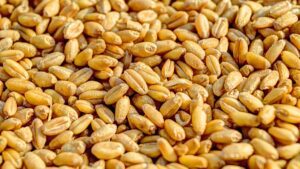
The King Salman Center for Rescue and Humanitarian Assistance (KSRelief) has donated $10 million to the United Nations World Food Program (WFP). King Salman Rescue and Humanitarian Relief Center (KSRelief) has donated $10 million to the United Nations World Food Program (WFP) to support war-affected Ukrainians in 1,200 facilities across the country with daily hot meals, according to the WFP press office.
“We are grateful to KSRelief for supporting a vital component of our emergency assistance programs in Ukraine that supports the most vulnerable Ukrainians and strengthens the local institutions and organizations that care for them,” said Marianne Ward, acting director of WFP Ukraine.
According to a press release, the agreement was signed between H.E. Dr. Abdullah Al Rabia, Advisor to the Royal Court and General Manager of KSRelief, and WFP Executive Director Cindy McCain.
Saudi Arabia’s contribution will help provide 50 million meals to the institutions that WFP supports (hospitals, shelters for internally displaced persons, orphanages, neuropsychiatric and geriatric institutions, and other public or private organizations that care for vulnerable Ukrainian citizens).
“We are pleased to be part of this important emergency program to respond to the urgent humanitarian needs of the affected population in Ukraine. KSrelief’s humanitarian assistance will provide vital food aid to the most vulnerable communities across the country,” the press office quoted KSRelief’s Assistant General Manager for Planning and Development, Ahmed Al Baiz, as saying.
The assistance provided will allow the purchase and delivery of about 7,600 tons of food. It is noted that all products, including flour, pasta, buckwheat, oatmeal, peas, sugar and oil, are purchased from Ukraine to support the local economy and food system.
Over the next six months, WFP’s institutional feeding program plans to provide food assistance to 210,000 vulnerable Ukrainians. KSRelief’s contribution will cover a significant portion of the program’s needs – approximately 67%. This is support for 140 thousand people.
During 2023, WFP’s institutional feeding program supported 460,000 Ukrainians in Cherkasy, Chernihiv, Chernivtsi, Dnipropetrovsk, Donetsk, Ivano-Frankivsk, Kharkiv, Kherson, Khmelnytskyi, Kirovograd, Kyiv, Lviv, Mykolayiv, Odessa, Poltava, Rivne, Sumy, Ternopil, Vinnytsia, Volyn, Zakarpattya, Zaporizhzhya and Zhytomyr regions.
Institutional feeding is one of the many ways WFP supports Ukrainians affected by the war. WFP is also distributing food packages in areas close to the front line where food is hard to find or very expensive, distributing cash assistance to vulnerable Ukrainians across the country, and supporting the safe release of agricultural land mines in Kharkiv Oblast to help farmers and food producers. WFP has also chartered 25 ships to export Ukrainian grain to countries in need through the Black Sea Grain Initiative and Grain from Ukraine.
The United Nations World Food Programme is the world’s largest humanitarian organization that saves lives in emergencies and uses food aid to build a path to peace, stability and prosperity for people recovering from conflict, natural disasters and the effects of climate change.

The United States of America will provide the UN World Food Program (WFP) with $68 million to buy wheat in Ukraine and then send it to countries most vulnerable in terms of food security, US Secretary of State Antony Blinken has said.
“The United States will contribute $68 million to the World Food Program to purchase Ukrainian wheat to address the acute global food crisis. We are committed to maintaining global food security for the most vulnerable and urge all countries to follow suit,” Blinken said on Twitter on Wednesday.
As reported, on June 28, the Cabinet of Ministers of Ukraine approved a draft agreement with WFP on the resumption of the work of its office in the country, which will allow the organization, among other things, to purchase agricultural products from Ukrainian companies for the implementation of international humanitarian programs.
WFP is expected to participate in the purchase of agricultural and food products from Ukrainian companies for the needs of UN international humanitarian projects.

The United Nations World Food Program (WFP) deepens cooperation with Ukraine in the context of the blocking of its maritime agricultural exports by warships of the aggressor country of the Russian Federation, the issue of the organization’s purchase of Ukrainian grain and its subsequent delivery to countries that are threatened hunger.
The relevant issue was discussed by Minister of Agrarian Policy and Food of Ukraine Mykola Solsky and WFP Executive Director David Muldow Beasley during a meeting in Kyiv, according to the website of the Ukrainian department on Friday.
“The possibility of purchasing surplus grains in Ukraine at the expense of the World Food Program was discussed in order to provide food for the countries of Africa and the Middle East and prevent global famine in these regions, the threat of which is very real,” the ministry said in a statement.
The agency stressed that WFP has deployed large-scale humanitarian assistance to Ukrainians affected by the war. In particular, contacts have been established with bakeries, flour mills and food industry enterprises in Ukraine for the purchase of goods from them and subsequent delivery to the regions affected by the Russian military invasion.
“We are talking about about 40 thousand tons of food products. Seven warehouses have been opened in Kyiv, Lvov, Dnipro, Vinnitsa, Chernivtsi, Odessa and Kropyvnytskyi. And in Lviv, Vinnitsa and Ivano-Frankivsk regions, financial assistance is provided to immigrants,” Beasley quotes press service of the Ministry of Agrarian Policy.
In turn, Solsky during the meeting focused on the need to unblock Ukrainian seaports and shipping routes in order to ensure the export of agricultural products from Ukraine.
“In order to stabilize the situation, it is important to ensure the logistics of supplies of agricultural products from Ukraine through unblocked ports and alternative routes. In addition, small and medium-sized Ukrainian farms and agricultural enterprises, which play a big role in ensuring national and global food security, need urgent help,” – quotes the department of its head.
As reported, on April 13, UN Secretary General António Guterres said that the war in Ukraine could doom more than 1/5 of humanity to poverty, want and hunger unprecedented for decades.
Deputy Minister of Economy – Trade Representative of Ukraine Taras Kachka stressed that the reason for the threat to world food security and rising prices for agricultural raw materials is the blockade of Ukrainian ports by Russian warships, therefore the lifting of the naval blockade of Ukraine is more effective for the food security of the world than the creation of new special funds. He stressed that Ukraine must repulse the aggressor at sea and on land, so that Ukrainian grain and oilseeds would reach the world market in full.
To date, the capacity of alternative logistics routes bypassing Ukrainian seaports is estimated at 600,000 tons of crops per month. This figure can be increased to 2-3 million tons of agricultural crops per month by increasing the capacity of railway and logistics crossings at the borders with the EU countries.
Before the Russian military invasion, Ukraine monthly exported up to 5 million tons of agricultural products through the ports of Odessa and Nikolaev, but now, due to their naval blockade by the Russian Federation, the country can transport about 500 thousand tons of grain monthly. This leads to a monthly shortfall of about $1.5 billion in export earnings.